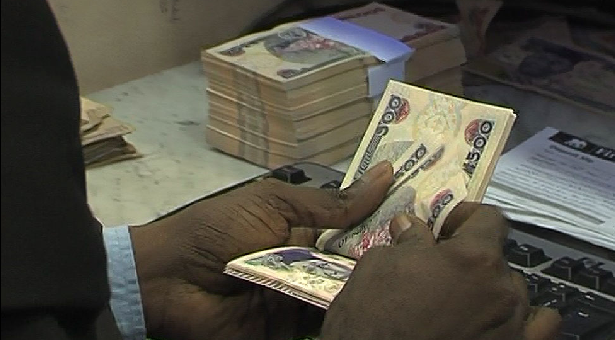Nigeria’s foreign exchange rate policy has long been as clear as the crude oil that underpins Africa’s largest economy.
Businesses and investors have had to contend with multiple exchange rates, contradictory statements from officials and differences of opinion between the central bank and the finance ministry over how the naira should be managed. President Bola Tinubu, who took office in May 2023, pledged to overhaul the currency regime with a view to attracting more investment, but the process has been bumpy.
The value of the naira has plummeted and it continues to trade at a discount on the parallel market because dollars are in short supply.
1. Why were multiple exchange rates introduced?
Nigeria is Africa’s largest producer of oil, which accounts for more than 90% of foreign-exchange earnings. Plunging crude prices starting in 2014 caused an economic squeeze.
Rather than devalue the naira, the central bank in 2017 opted to implement one rate for government transactions, pegged to the US dollar, and a weaker, market-determined rate for investors and exporters known as the Nafex. Other rates were instituted for travelers and small and medium-sized enterprises.
The system was aimed at improving liquidity and encouraging dollar inflows, but it failed to deliver. A currency black market that valued the naira at less than the official rate sprang up to meet pent-up demand for dollars.
The official and parallel rates almost converged after Tinubu’s reforms were announced, but the spread has since widened.
2. Why was the system so problematic?
The web of varying exchange rates gave rise to confusion and uncertainty, and made it difficult for the government and businesses to budget and plan.
It also gave rise to widespread currency speculation, a practice that Tinubu said had made a handful of people “filthy rich, simply by moving money from one hand to another.” The International Monetary Fund and the World Bank joined investors in calling for a system overhaul.
3. What changes have been make?
In June 2023, the central bank announced that the naira would trade freely until it found a new market-related level.
However, the authorities didn’t really let the currency go and tried to limit its depreciation. As a result, the supposed float turned out to be nothing more than a one-off devaluation. The central bank also retained an official exchange rate at which it supplied dollars to a few customers.
That meant the multiple rate system which the reforms were aimed at removing continued in practice. There remains a thriving parallel market, where the naira touched a record low in January.
4. What else can be done?
In the official market, policymakers have allowed the currency to trade in wider bands while seeking to boost its value by selling short-dated, open-market operation naira notes at attractive yields. The financial crimes watchdog has allowed licensed traders to post their naira-dollar exchange rates online.
This is aimed at boosting competition and price discovery in the market, and countering the informal trade, according to Aminu Gwadabe, the president of the Association of Bureaux de Change Operators of Nigeria.
The previous leadership of the central bank sought to control bureaux de change and limit the visibility of the parallel market to shore up the official rate — an approach that backfired.
5. What’s the outlook for the naira?
Governor Olayemi Cardoso, a former chairman of Citigroup Inc.’s Nigerian operations who was appointed to his post in September 2023, has signaled that the bank will adopt a far more orthodox approach than it did under his predecessor Godwin Emefiele.
(Emefiele was suspended by Tinubu and then arrested on a raft of charges, including fraud. His trial continues and he denies wrongdoing). Cardoso said the bank will now focus on achieving monetary and price stability and steadying the naira.
It intends to use inflation targeting — rather than trying to control the money supply — to achieve those goals. The annual inflation rate reached 28.9% at the end of 2023, an almost three-decade high, due in large part to the naira’s slump and the scrapping of fuel subsidies.
The bank’s monetary policy committee is due to meet in late February for the first time in seven months, and a steep rise in borrowing costs is anticipated. Cardoso expects inflation to moderate in 2024 and considers the naira to be undervalued.
6. What does it all mean for investment in Nigeria?
Tinubu’s reforms were welcomed at first but an influx of capital hasn’t materialized, with many foreign investors sitting on the sidelines until it becomes evident that the currency has stabilized and that they can earn sufficient returns on Nigerian assets to compensate for the many risks.
Drug maker GSK Plc and consumer-goods company Procter & Gamble Co. are among those that have exited the country as hard currency shortages made it increasingly difficult for importers to bring in goods. Local business leaders have expressed concern that a sudden hike in interest rates aimed at defending the naira could stifle growth.

 Forex3 weeks ago
Forex3 weeks ago
 Naira3 weeks ago
Naira3 weeks ago
 Billionaire Watch3 weeks ago
Billionaire Watch3 weeks ago



 Naira3 weeks ago
Naira3 weeks ago






 Naira2 weeks ago
Naira2 weeks ago




 Naira2 weeks ago
Naira2 weeks ago




 Naira4 weeks ago
Naira4 weeks ago






 Naira1 week ago
Naira1 week ago






















